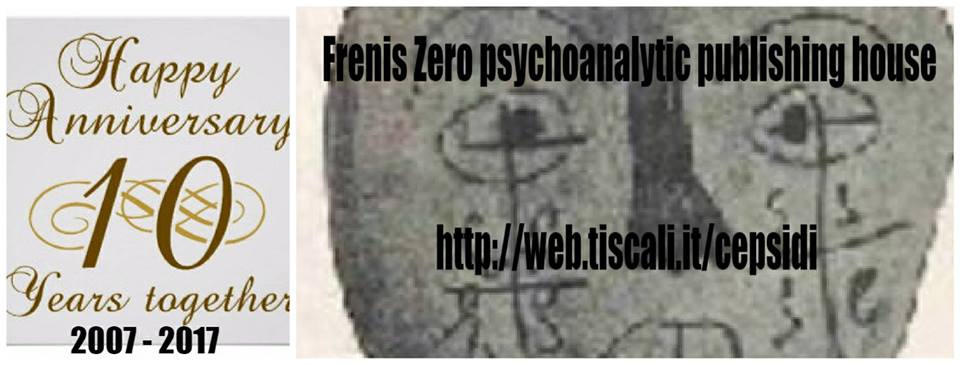|
A.S.S.E.Psi.
web site (History of Psychiatry and Psychoanalytic Psychotherapy
)
A.S.S.E.Psi.NEWS
(to subscribe our monthly newsletter)
Ce.Psi.Di. (Centro
di Psicoterapia Dinamica "Mauro Mancia")
Maitres
ŕ dispenser (Our reviews about psychoanalytic congresses)
Biblio
Reviews (Recensioni)
Congressi
ECM (in italian)
Events
(our congresses)
Tatiana Rosenthal
and ... other 'psycho-suiciders'
Thalassa.
Portolano of Psychoanalysis
PsychoWitz - Psychoanalysis and Humor (...per ridere un po'!)
Giuseppe Leo's Art
Gallery
Spazio
Rosenthal (femininity and psychoanalysis)
Psicoanalisi
Europea Video
Channel
A.S.S.E.Psi. Video
Channel
Ultima uscita/New issue:
"Infant
Research and Psychoanalysis" (Third Edition) edited
by Giuseppe Leo
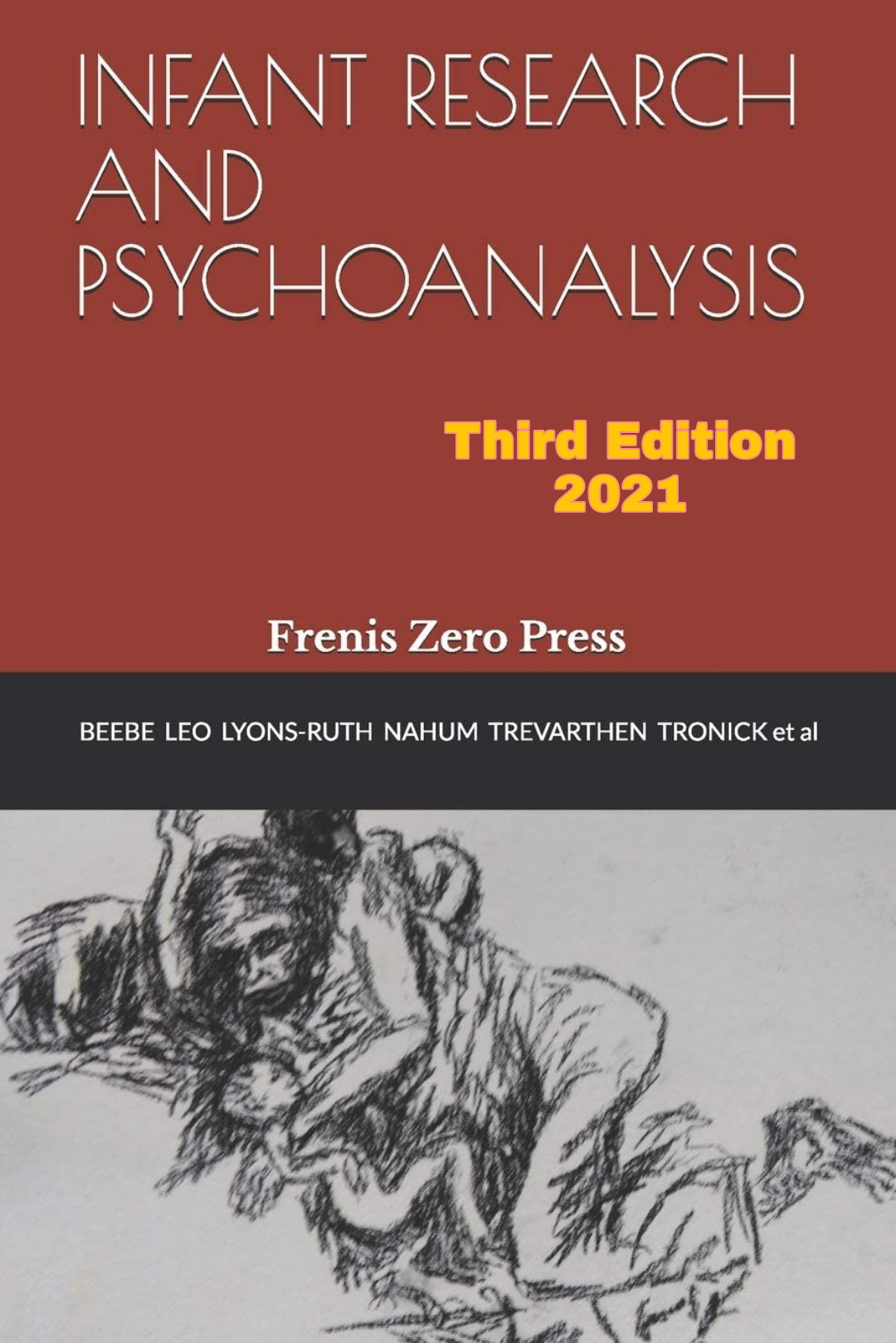
"
Edited
by Giuseppe Leo
Writings
by: B. Beebe K.
Lyons-Ruth J. P. Nahum D. Schechter
E. Solheim C.
Trevarthen E. Z. Tronick
L.
Vulliez-Coady
Publisher:
Frenis Zero
Collection:
Borders of Psychoanalysis
Year:
2021
Pages:
285
ISBN: 978-88-97479-24-6
Click
here to buy the book/Compra su Amazon

"Psychanalyse,
Lieux de Mémoire et Traumatismes Collectifs" (Third
Edition) edited by
Giuseppe Leo
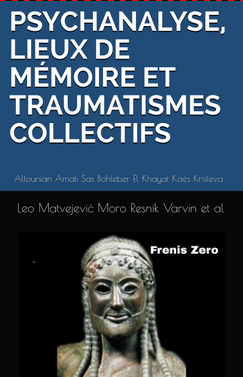
Writings by: J. Altounian, S. Amati Sas, W.
Bohleber, M. El Husseini, R. El Khayat, Y. Gampel R. Kaës, J.
Kristeva, G. Leo, A. Loncan, P. Matvejević, M.-R. Moro, S.
Resnik, S. Varvin
Editore/Publisher: Edizioni Frenis Zero
ISBN: 978-88-97479-22-2
Anno/Year: 2021
Pages: 546
Click
here to buy the book/Compra su Amazon

"Enactment
in Psychoanalysis" - Second Edition) edited by
Giuseppe Leo & Giuseppe Riefolo
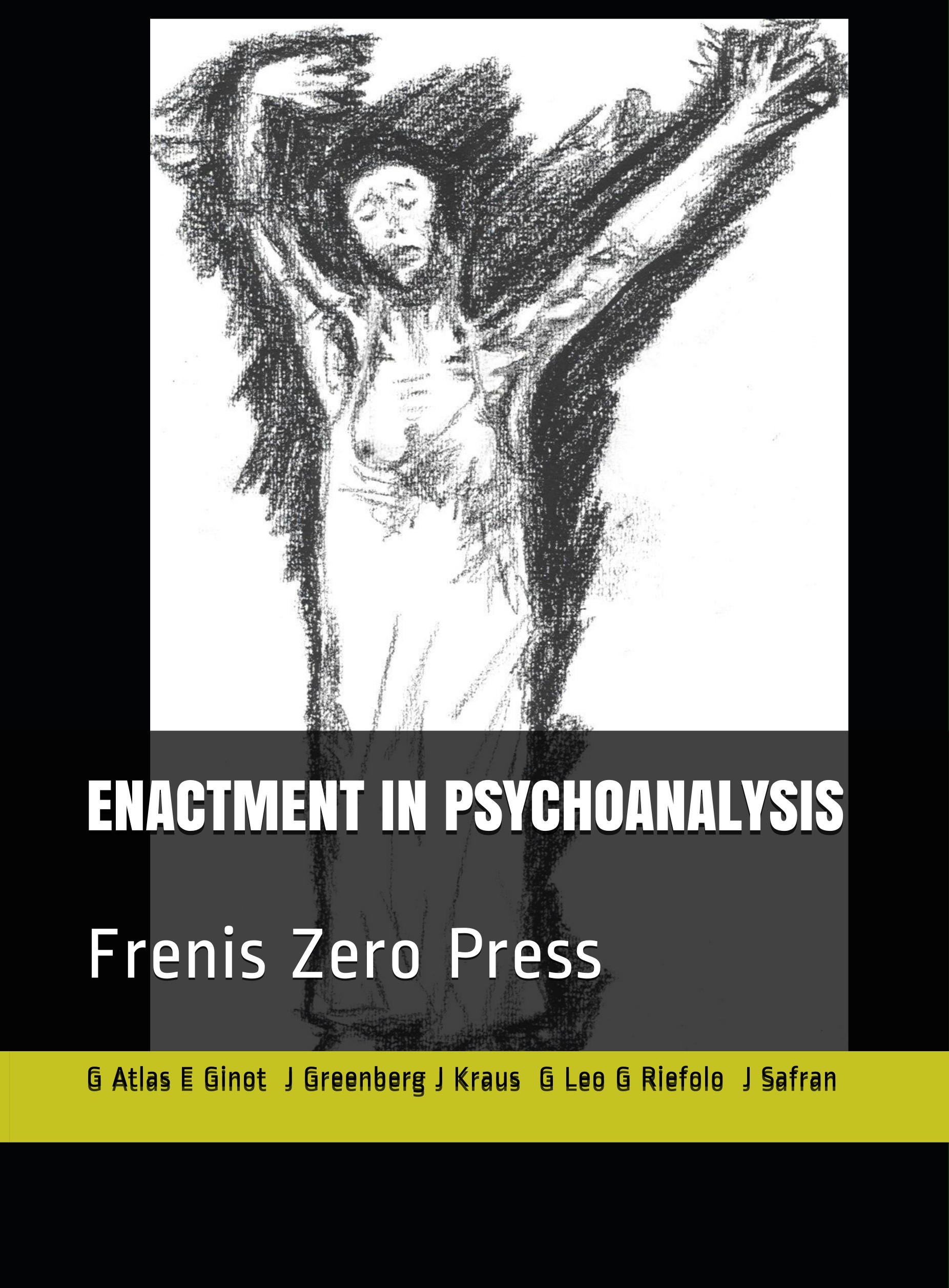
Edited
by Giuseppe Leo & Giuseppe Riefolo
Writings
by: G. Atlas E. Ginot J.R.
Greenberg J. Kraus J.D. Safran
Publisher:
Frenis Zero
Collection:
Borders of Psychoanalysis
Year:
2020
Pages:
333
ISBN: 978-88-97479-19-2
Click
here to buy the book/Compra su Amazon

"My
Ideas Felt Like Outsize Clothes. A tale for Etty Hillesum" by
Giuseppe Leo
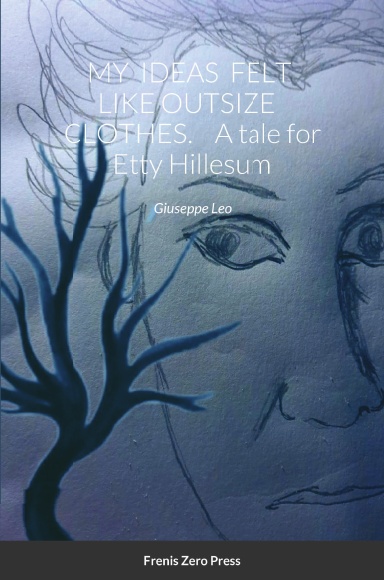
Editore/Publisher: Edizioni Frenis Zero
ISBN: 978-88-97479-33-8
Anno/Year: 2020
Pages: 122
Click
here to order the book/Ordina
su Lulu

"Environmental
Crisis and Pandemic. A Challenge for Psychoanalysis"
edited by Giuseppe Leo (Second
Edition)
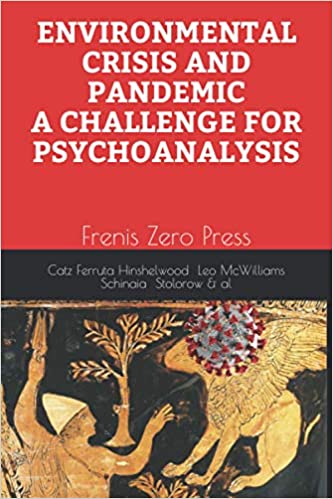
Writings by: H. Catz, A. Ferruta,
M. Francesconi, P. R. Goisis, R. D. Hinshelwood, G.
Leo, N. McWilliams,
G. Riefolo, M. Roth, C.
Schinaia, D. Scotto Di Fasano, R. D. Stolorow
Editore/Publisher: Edizioni Frenis Zero
ISBN: 978-88-97479-37-6
Anno/Year: 2020
Pages: 312
Click
here to order the book/Ordina
su Lulu

Click
here to buy the book/Compra su Amazon

"Psychanalyse,
Lieux de Mémoire et Traumatismes Collectifs" sous
la direction de Giuseppe Leo
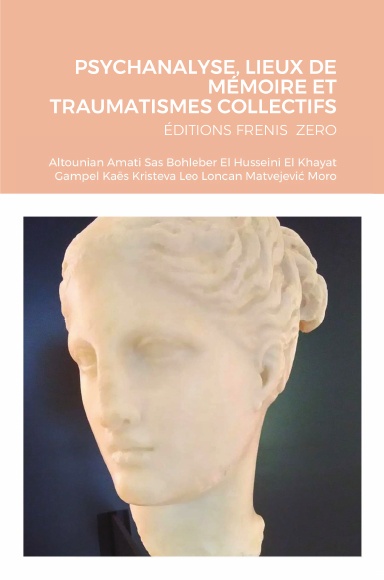
Writings by: J. Altounian, S. Amati Sas, W.
Bohleber, M. El Husseini, R. El Khayat, Y. Gampel R. Kaës, J.
Kristeva, G. Leo, A. Loncan, P. Matvejević, M.-R. Moro
Editore/Publisher: Edizioni Frenis Zero
ISBN: 978-88-97479-29-1
Anno/Year: 2020
Pages: 482
Click
here to order the book/Ordina
su Lulu

"Fear
of Lockdown. Psychoanalysis, Pandemic Discontents and
Climate Change"
edited by Giuseppe Leo
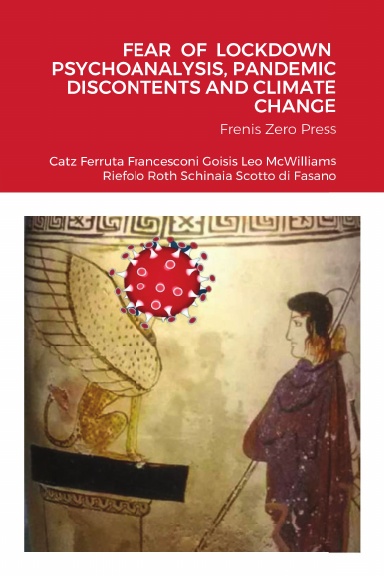
Writings by: H. Catz, A. Ferruta,
M. Francesconi, P. R. Goisis, G.
Leo, N. McWilliams,
G. Riefolo, M. Roth, C.
Schinaia, D. Scotto Di Fasano
Editore/Publisher: Edizioni Frenis Zero
ISBN: 978-88-97479-21-5
Anno/Year: 2020
Pages: 295
Click
here to order the book/Ordina
su Lulu

Click
here to buy the book/Compra su Amazon

"Rock
Music & Psychoanalysis"
Second Edition
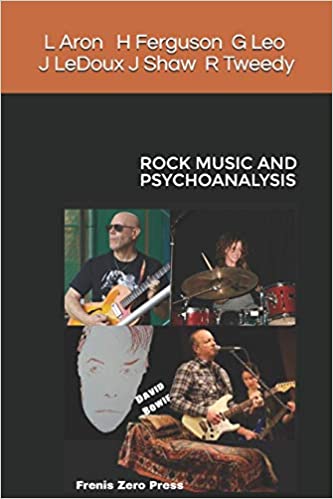
Edited
by: Giuseppe Leo
Authored
by/autori: Lewis Aron Heather
Ferguson Joseph LeDoux Giuseppe Leo John Shaw
Rod Tweedy
Editore/Publisher:
Edizioni Frenis Zero
Collection/Collana: Borders
of Psychoanalysis
Anno/Year:
2020
Pagine/Pages:
221
ISBN:978-88-97479-35-2
Click
here to buy the book/Compra su Amazon

"Essere
nella cura"
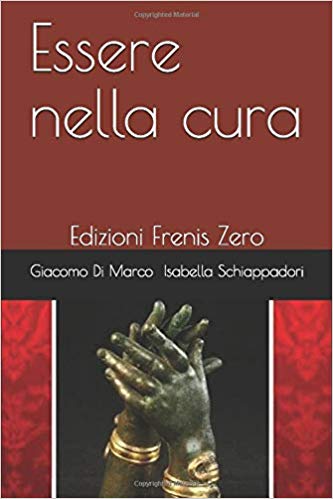
Authored
by/autori: Giacomo Di Marco & Isabella
Schiappadori
Editore/Publisher:
Edizioni Frenis Zero
Collection/Collana: Confini
della Psicoanalisi
Anno/Year:
2019
Pagine/Pages:
210
ISBN:978-88-97479-17-8
Click
here to order the book
"Enactment
in Psychoanalysis"
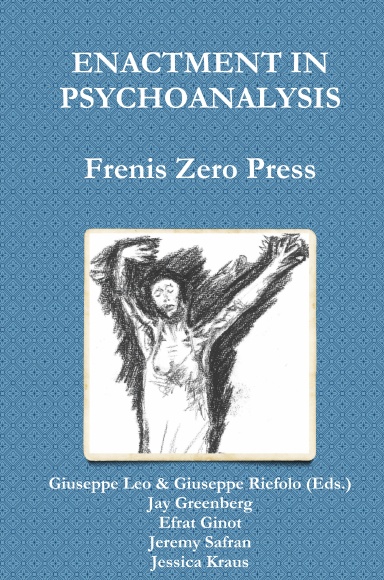
Edited
by Giuseppe Leo & Giuseppe Riefolo
Writings
by: E. Ginot J.R.
Greenberg J. Kraus J.D. Safran
Publisher:
Frenis Zero
Collection:
Borders of Psychoanalysis
Year:
2019
Pages:
326
ISBN: 978-88-97479-15-4
Click
here to order the book
"Infant
Research and Psychoanalysis"

Edited
by Giuseppe Leo
Writings
by: B. Beebe K.
Lyons-Ruth J. P. Nahum E. Solheim C.
Trevarthen E. Z. Tronick L.
Vulliez-Coady
Publisher:
Frenis Zero
Collection:
Borders of Psychoanalysis
Year:
2018
Pages:
273
ISBN: 978-88-97479-14-7
Click
here to order the book
"Fundamentalism
and Psychoanalysis"
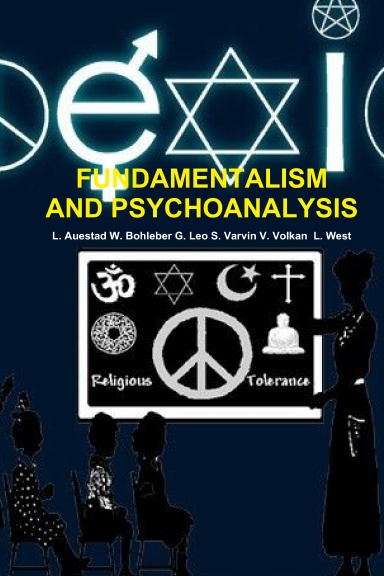
Edited
by Giuseppe Leo
Prefaced
by: Vamik D. Volkan
Writings
by: L. Auestad W.
Bohleber S. Varvin L. West
Publisher:
Frenis Zero
Collection:
Mediterranean Id-entities
Year:
2017
Pages:
214
ISBN: 978-88-97479-13-0
Click
here to order the book
"Psicoanalisi, luoghi della resilienza
ed immigrazione"
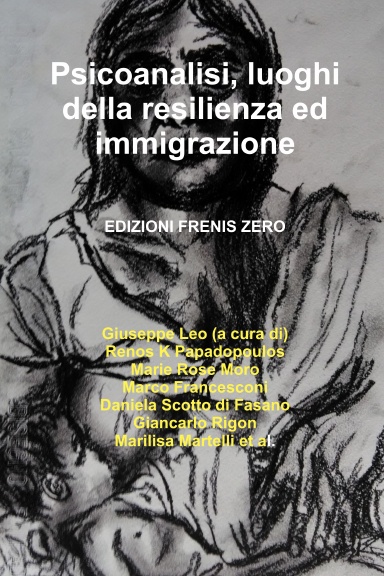
Edited
by/a cura di: Giuseppe Leo
Writings by/scritti di:
S.
Araůjo Cabral, L.
Curone,
M. Francesconi,
L.
Frattini,
S.
Impagliazzo,
D. Centenaro Levandowski, G. Magnani, M. Manetti, C. Marangio,
G. A. Marra e Rosa, M. Martelli,
M. R. Moro, R. K. Papadopoulos,
A. Pellicciari,
G. Rigon,
D.
Scotto di Fasano,
E. Zini, A. Zunino
Editore/Publisher: Edizioni Frenis Zero
Collection/Collana: Mediterranean
Id-entities
Anno/Year:
2017
Pagine/Pages:
372
ISBN:978-88-97479-11-6
Click
here to order the book
"Psicoanalisi in Terra Santa"
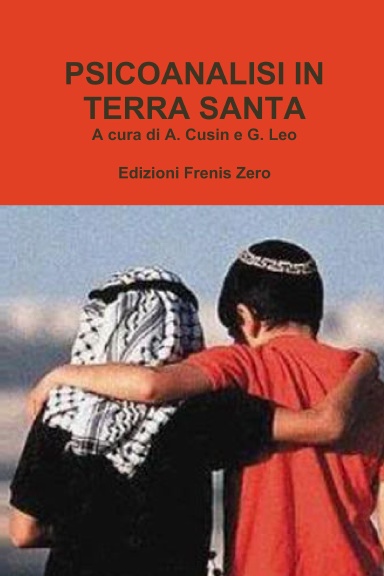
Edited
by/a cura di: Ambra Cusin & Giuseppe Leo
Prefaced by/prefazione
di:
Anna Sabatini Scalmati
Writings by/scritti di:
H. Abramovitch A. Cusin M. Dwairy
A. Lotem M.
Mansur M. P. Salatiello Afterword
by/ Postfazione
di:
Ch. U. Schminck-Gustavus
Notes by/ Note di: Nader Akkad
Editore/Publisher: Edizioni Frenis Zero
Collection/Collana: Mediterranean
Id-entities
Anno/Year:
2017
Pagine/Pages:
170
ISBN:978-88-97479-12-3
Click
here to buy the book
"Essere bambini a Gaza. Il trauma
infinito"

Authored
by/autore: Maria Patrizia Salatiello
Editore/Publisher: Edizioni Frenis Zero
Collection/Collana: Mediterranean
Id-entities
Anno/Year:
2016
Pagine/Pages:
242
ISBN:978-88-97479-08-6
Click
here to buy the book
Psychoanalysis,
Collective Traumas and Memory Places (English Edition)
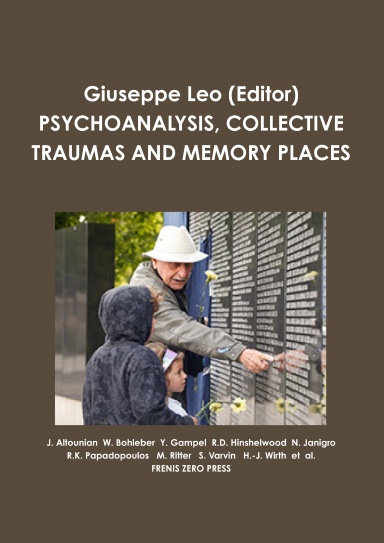
Edited
by/a cura di: Giuseppe Leo Prefaced by/prefazione
di:
R.D.Hinshelwood
Writings by/scritti di: J. Altounian
W. Bohleber J. Deutsch
H. Halberstadt-Freud Y. Gampel
N. Janigro R.K. Papadopoulos
M. Ritter S. Varvin H.-J. Wirth
Editore/Publisher: Edizioni Frenis Zero
Collection/Collana: Mediterranean
Id-entities
Anno/Year:
2015
Pagine/Pages:
330
ISBN:978-88-97479-09-3
Click
here to buy the book
"L'uomo
dietro al lettino" di
Gabriele Cassullodi
Gabriele Cassullodi
Gabriele Cassullo
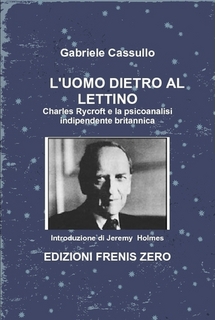
Prefaced
by/prefazione di: Jeremy
Holmes
Editore/Publisher: Edizioni Frenis Zero
Collection/Collana: Biografie
dell'Inconscio
Anno/Year:
2015
Pagine/Pages:
350
ISBN:978-88-97479-07-9
Click
here to order the book
"Neuroscience
and Psychoanalysis" (English Edition)

Edited by/a cura di: Giuseppe Leo
Prefaced by/prefazione
di: Georg Northoff
Writings by/scritti di: D. Mann A. N. Schore
R. Stickgold
B.A. Van Der Kolk
G. Vaslamatzis M.P. Walker
Editore/Publisher: Edizioni Frenis Zero
Collection/Collana: Psicoanalisi e neuroscienze
Anno/Year: 2014
Pagine/Pages: 300
ISBN:978-88-97479-06-2
Click
here to order the book
Vera
Schmidt, "Scritti su psicoanalisi infantile ed
educazione"

Edited by/a cura di: Giuseppe Leo
Prefaced by/prefazione
di: Alberto Angelini
Introduced by/introduzione di: Vlasta Polojaz
Afterword by/post-fazione di: Rita Corsa
Editore/Publisher: Edizioni Frenis Zero
Collana: Biografie dell'Inconscio
Anno/Year: 2014
Pagine/Pages: 248
ISBN:978-88-97479-05-5
Click
here to order the book
Resnik,
S. et al. (a cura di Monica Ferri), "L'ascolto dei
sensi e dei luoghi nella relazione terapeutica"
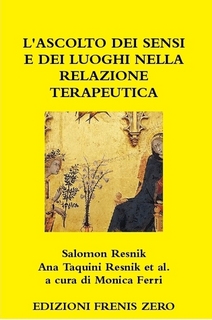
Writings by:A.
Ambrosini, A. Bimbi, M. Ferri,
G. Gabbriellini, A. Luperini, S. Resnik,
S. Rodighiero, R. Tancredi, A. Taquini Resnik,
G. Trippi
Editore/Publisher: Edizioni Frenis Zero
Collana: Confini della Psicoanalisi
Anno/Year: 2013
Pagine/Pages: 156
ISBN:978-88-97479-04-8
Click
here to order the book
Silvio
G. Cusin, "Sessualitŕ e conoscenza"
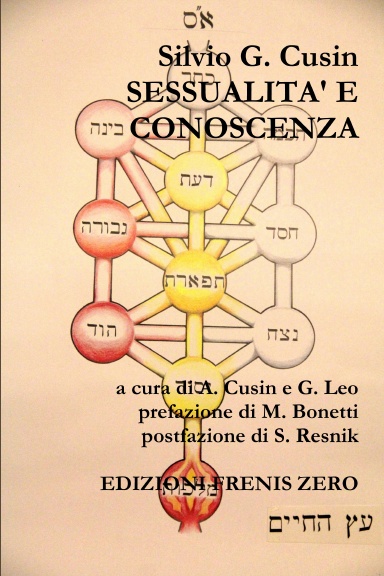
A cura di/Edited by: A. Cusin & G. Leo
Editore/Publisher: Edizioni Frenis Zero
Collana/Collection: Biografie dell'Inconscio
Anno/Year: 2013
Pagine/Pages: 476
ISBN: 978-88-97479-03-1
Click
here to order the book
AA.VV.,
"Psicoanalisi e luoghi della riabilitazione", a cura
di G. Leo e G. Riefolo (Editors)
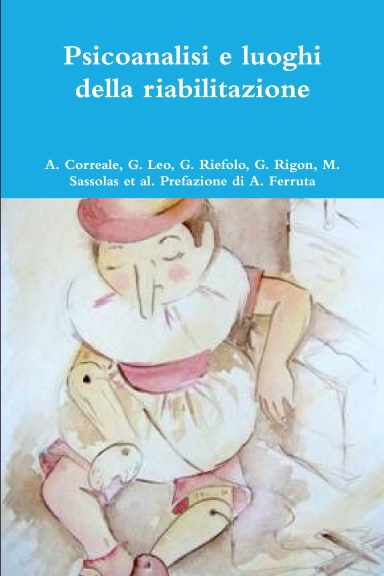
A cura di/Edited by: G. Leo & G. Riefolo
Editore/Publisher: Edizioni Frenis Zero
Collana/Collection: Id-entitŕ mediterranee
Anno/Year: 2013
Pagine/Pages: 426
ISBN: 978-88-903710-9-7
Prezzo/Price:
€ 39,00
Click
here to order the book
AA.VV.,
"Scrittura e memoria", a cura di R. Bolletti (Editor)
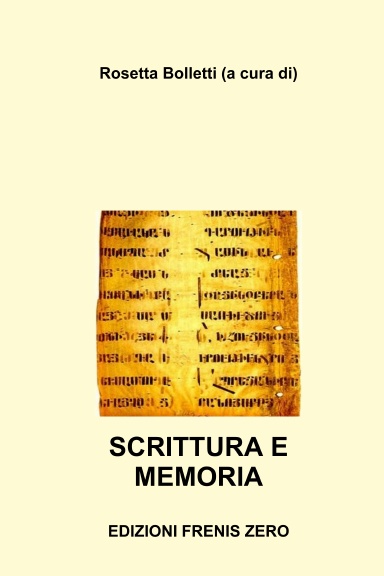
Writings by: J.
Altounian, S. Amati Sas, A. Arslan, R. Bolletti, P. De
Silvestris, M. Morello, A. Sabatini Scalmati.
Editore/Publisher: Edizioni Frenis Zero
Collana: Cordoglio e pregiudizio
Anno/Year: 2012
Pagine/Pages: 136
ISBN: 978-88-903710-7-3
Click
here to order the book
AA.VV., "Lo
spazio velato. Femminile e discorso
psicoanalitico"
a cura di G. Leo e L. Montani (Editors)
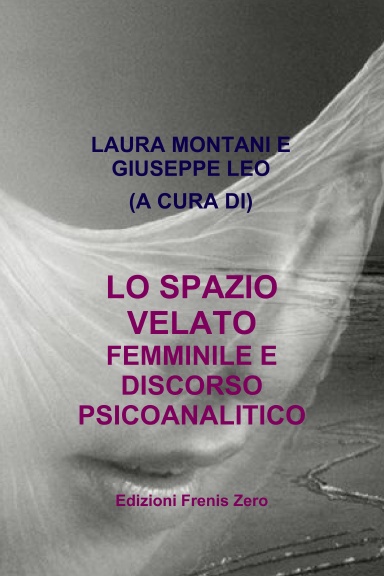
Writings by: A.
Cusin, J. Kristeva, A. Loncan, S. Marino, B.
Massimilla, L. Montani, A. Nunziante Cesaro, S.
Parrello, M. Sommantico, G. Stanziano, L.
Tarantini, A. Zurolo.
Editore/Publisher: Edizioni Frenis Zero
Collana: Confini della psicoanalisi
Anno/Year: 2012
Pagine/Pages: 382
ISBN: 978-88-903710-6-6
Click
here to order the book
AA.VV., Psychoanalysis
and its Borders, a cura di
G. Leo (Editor)
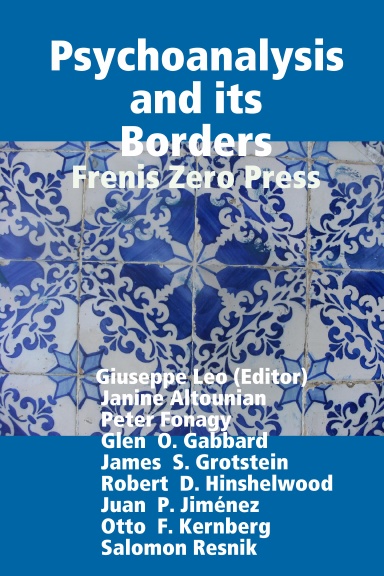
Writings by: J. Altounian, P.
Fonagy, G.O. Gabbard, J.S. Grotstein, R.D. Hinshelwood, J.P.
Jimenez, O.F. Kernberg, S. Resnik.
Editore/Publisher: Edizioni Frenis Zero
Collana/Collection: Borders of Psychoanalysis
Anno/Year: 2012
Pagine/Pages: 348
ISBN: 978-88-974790-2-4
Click
here to order the book
AA.VV.,
"Psicoanalisi e luoghi della negazione", a cura di A.
Cusin e G. Leo
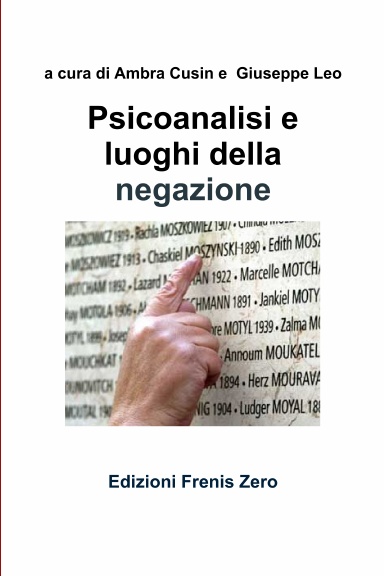
Writings by:J.
Altounian, S. Amati Sas, M. e M. Avakian, W. A.
Cusin, N. Janigro, G. Leo, B. E. Litowitz, S. Resnik, A.
Sabatini Scalmati, G. Schneider, M. Šebek,
F. Sironi, L. Tarantini.
Editore/Publisher: Edizioni Frenis Zero
Collana/Collection: Id-entitŕ mediterranee
Anno/Year: 2011
Pagine/Pages: 400
ISBN: 978-88-903710-4-2
Click
here to order the book
"The Voyage Out" by Virginia
Woolf
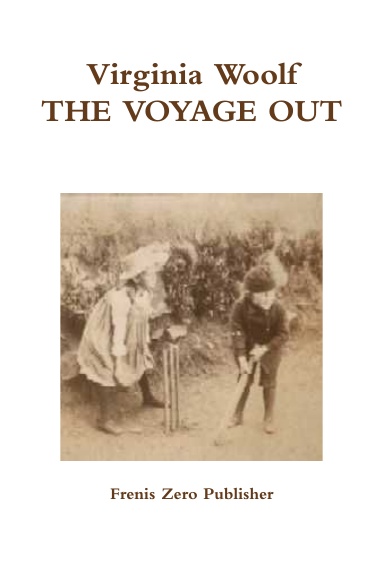
Editore/Publisher: Edizioni Frenis Zero
ISBN: 978-88-97479-01-7
Anno/Year: 2011
Pages: 672
Click
here to order the book
"Psicologia
dell'antisemitismo" di Imre Hermann
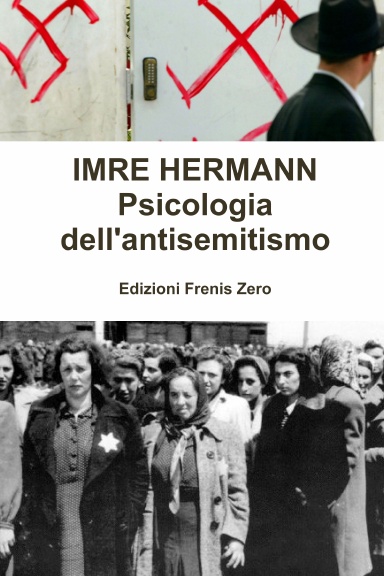
Author:Imre Hermann
Editore/Publisher: Edizioni Frenis Zero
ISBN: 978-88-903710-3-5
Anno/Year: 2011
Pages: 158
Click
here to order the book
"Vite soffiate. I vinti della
psicoanalisi" di Giuseppe Leo
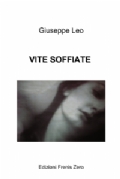
Editore/Publisher: Edizioni Frenis Zero
Edizione: 2a
ISBN: 978-88-903710-5-9
Anno/Year: 2011
Click
here to order the book
"La Psicoanalisi e i suoi
confini" edited by Giuseppe Leo
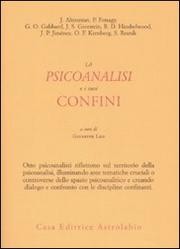
Writings by: J.
Altounian, P. Fonagy, G.O. Gabbard, J.S. Grotstein, R.D.
Hinshelwood, J.P. Jiménez, O.F. Kernberg, S. Resnik
Editore/Publisher: Astrolabio Ubaldini
ISBN: 978-88-340155-7-5
Anno/Year: 2009
Pages: 224
Prezzo/Price: € 20,00
"La Psicoanalisi. Intrecci Paesaggi
Confini"
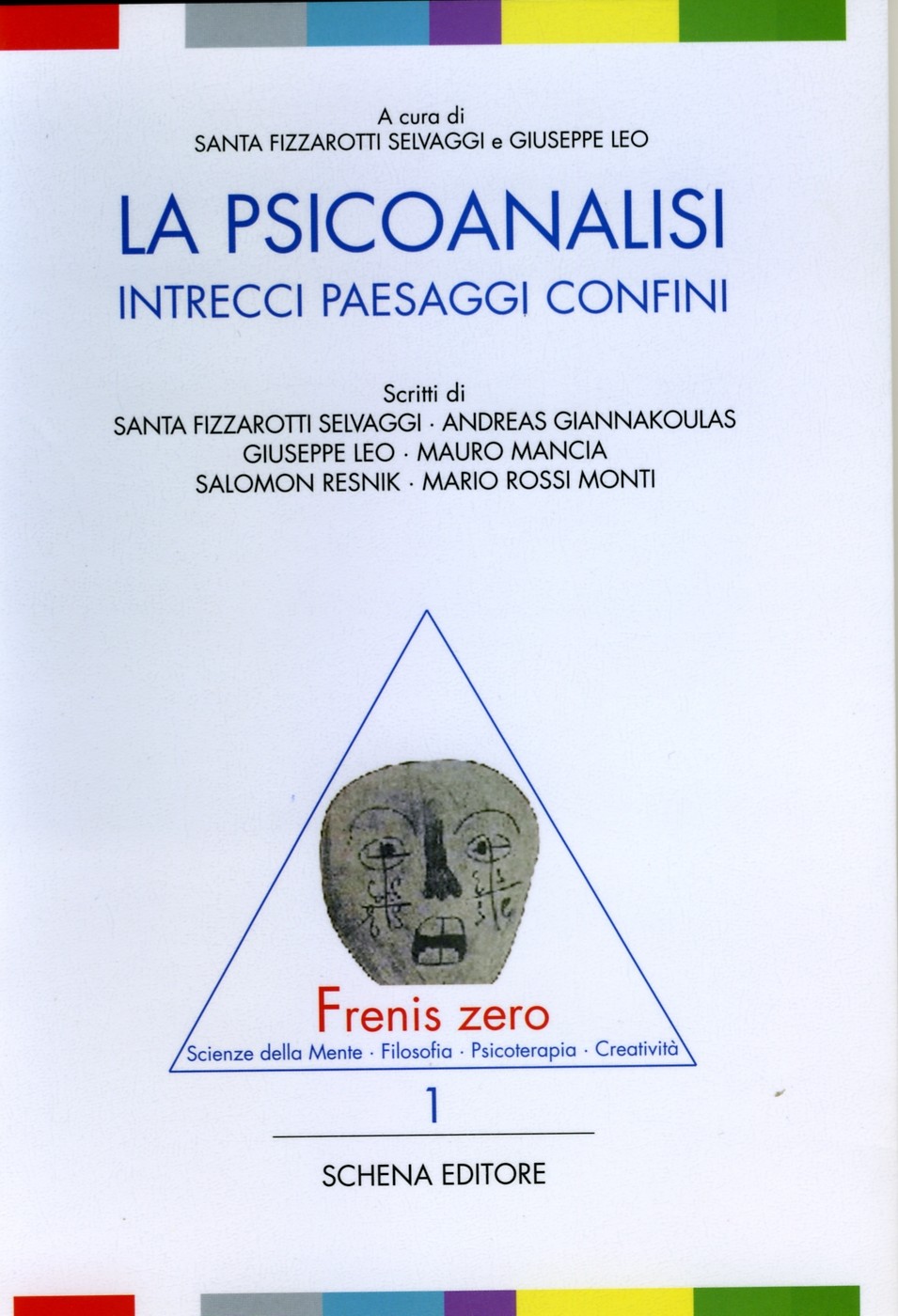
Edited by S. Fizzarotti Selvaggi, G.Leo.
Writings by: Salomon Resnik, Mauro Mancia, Andreas Giannakoulas,
Mario Rossi Monti, Santa Fizzarotti Selvaggi, Giuseppe Leo.
Publisher: Schena Editore
ISBN 88-8229-567-2
Price: € 15,00
Click here to order the
book |
|
“Becol dor va dor haiav adam learot et azmň chilu u
iazŕ mimizraim”
“In every generation it is the duty of each of us to
imagine that it is we who were saved from the
bondage of Egypt ”
From the Passover Haggadah
Introduction
Most
historians born during Nazism explicitly or implicitly acknowledge
that to dig up the historical
events of those years implies not only searching and interpreting a
historical past similar to
any other, but it also involves the process of recovering and
interpreting basic elements of their own
life and the capacity to cope with these elements. Acknowledging it is
far from producing an agreement
on how to define the Nazi regime, or how to interpret its internal
dynamics, or how to put
it in a wider historical context. By admission of the historians
themselves, however, in describing
that past there is a personal involvement which is full of anxiety for
the work to be done.
In
a paper published in the International Journal of Psychoanalysis in
1968, William Niederland who
has treated survivors of persecution for many years, describes a
"survivor syndrome", which appears
to be characterized by the persistence of multiple symptoms, and in
particular chronic depressive
conditions and anxiety reactions, insomnia, nightmares, personality
changes, and far-reaching somatization.
More specifically, clinical observation of about 800 Nazi persecution
survivors
revealed that the survivor syndrome is composed of the following
manifestations:
i.
Anxiety—the prevailing complaint. It is associated with fear
of renewed persecution, sleep disturbances,
multiple phobias, anxiety dreams, and characteristic "re-run"
nightmares. Regarding the
latter, I have observed that many patients suffer from chronic
insomnia partly as an attempt to limit
their hours of sleep because their dreams and nightmares, reflecting
the in concretu et
situ concentration
experience, are unendurable for them.
ii.
Disturbances of cognition and memory, such as: amnesias,
hyperamnesias, and, especially upon awakening
from nightmares, confusion with disorientation between the present and
the period of persecution.
Also, "lost and bewildered" states as well as dissociative
phenomena.
iii.
Chronic depressive states, covering the whole spectrum from
masochistic character changes to psychotic
depression. The incidence and severity correlate closely with the
"survivor’s guilt" and certain
specific traumata, such as loss of children, parents, siblings,
history of rape, etc.
iv.
Tendency to isolation, withdrawal, and brooding seclusion; tenuous
and unstable objectrelations, with
a marked ambivalence notable in lasting disturbances of
object-relations.
v.
P sychotic and psychosis-like pictures were observed with a
relatively high incidence. Regressive and
primitive methods of dealing with aggression result in
schizophrenic-like symptoms without the relevant
consistency or "process". Isolated symptoms like night-time
persecutory hallucinations, states
of depersonalization, hypochondriasis, or paranoid manifestations have
in this group a very specific
history and determination.
vi.
Alterations of personal identity; impairment in the sense of
personal identity, in the sense of time
and space, body image and self image. These alterations are
subjectively felt and lasting, as evidenced
by the patients' frequent complaint: "I am now a different person"
(in severe cases: "I am not
a person".)
vii.
Psychosomatic conditions including: (a) diseases related to
chronic tension states; (b) gastrointestinal
conditions, peptic ulcer and related symptoms; (c) cardiovascular
disturbances, with or
without hypertensive states; (d) typical "survivor’s triad":
headaches—persistent nightmares— chronic
depression, and various other psychosomatic complaints.
viii.
Of great importance—not only phenomenologically—is a certain
"living corpse" appearance
or behaviour
which many of the victims show and which seems to originate from the
prolonged exposure to
death in the camps. This "walking" or "shuffling corpse"
appearance gives the victim a macabre,
shadowy or ghost-like imprint, difficult to describe, but which seems
to be in the nature of an
all-pervasive psychological scar on the total personality.
(Niederland,
W. G. (1968). Clinical Observations on the "Survivor Syndrome. International
Journal of
Psychoanalysis 49:
313-315)
Psychoanalysts
who have worked with the survivors of the Holocaust, like Jay Lifton -
“The Nazi Doctors”
(1986) - know very well that a kind of survivor syndrome can be
found in a transitory and partial
way in those who have dealt with this subject. Sheldon Roth, a
Brooklyn psychoanalyst, for instance,
tells how he felt “overpowered by terrifying emotions” and couldn’t
find “words to give form
to his feelings” “All was embedded in a mild but distinct
depressive affective tone” while he was
reading literary works such Night, by Elie Wiesel or Survival
in Auschwitz by Primo Levi, and “the
present seemed less real”.
The
guilt of the survivor (guilt to have survived) will therefore
fall not only upon his children, but also
upon those who were not directly affected by the memory of the Shoah
but who got in touch with
that memory. We agonize over events which we are no longer able to
control, on deaths which we
are no longer able to stop and something within us tries to bring back
to life the victims of this tremendous
injustice. We go on reading, we insist in the effort to understand,
and the more we go on
with reading, with listening to the witnesses, with watching those
unbelievable pictures, the more
we feel detached from the present time. This unstoppable bewitchment
is common with people who
experienced the study of the Shoah.
Also
Claude Lanzmann, the director of the film “Shoah”, mentioned that
he had been demented as long
as he was making “ Shoah”. Trying to understand the Holocaust only
in historical or
biographical
terms seemed to him an “intellectual scandal” or “an absurd
dream of a non-violent death”
, an attempt to justify murder and mass murder.
Saul
Friedlander, one of the most important contemporary scholars of the
Shoah, repeats how for his
generation “To be at the same time a guardian of the historical
memory and a part of that memory
may produce a disturbing dissonance but also create intuitive
interpretations that otherwise would
be barred” (1997)
Hanna
Arendt, in 1956 speaks of a “lapse between the past and the present
[…] between what has irrevocably
happened
and what inevitably exists.” In order to understand this
lapse it is necessary to analyze
the meaning of the past, the unaware shifts of meaning which
characterize the historical progress
and represent a darkening of the original meanings. For Arendt the
past exercises a double–edged
authority on the present: on one hand it passes along a somehow
indissoluble legacy to
the next generations; on the other the very same legacy degenerates
because of the several reversals
of thought and of its following stratifications.
Giorgio
Agamben (1998) says that thanks to wider and more accurate research
the problem of the historical
circumstances - i.e. material, technical, bureaucratic, legal
circumstances - in which the Shoah
happened is now clear enough. However, he says, the ethical and
political meanings of the Shoah,
not to speak of its human comprehension, are far from being understood.
Auschwitz
cannot be explained only intellectually: he who would like to
understand it has to seek it and
experience it.
Historical
studies and private memories
The
Hebrew Thorah seems to have no hesitations in prescribing memory as a
mitzvah (obligation).
In
the Thorah the Jews are ordered to remember and not to forget.
As Yerushalmi points out (1982) the
word zakhor (remember) is repeated at least 160 times in the
Bible and has God or the Jews as subjects
(that is, not only Israel must remember, but God as well). In the
beginning of this paper I
quote
a famous passage from the Haggadah: “In every generation it is the
duty of each of us to remember
that it is we who were saved from the bondage of Egypt” (and later
on it insists: “Avadim ainu
le Pharň bemizrahim “Remember that you were a slave in Egypt”).
But
together with this final order to remember, in the Thorah there is
some sort of desperate frustration
with the awareness of how unstable and short-lived human memory is.
The order to
remember
seems to deal with the fear to forget not what happened in the
past, but how those past events
happened. In the Talmud the various Rabbis seem always engaged in the
continuous and tiring
exploration of the meaning of the history handed down so far. They are
also engaged in the effort
of interpreting this history in useful terms for their own generation
and the future generations.
For
those rabbis history has only one purpose: the re-establishment of God’s
kingdom on Earth, and
collective memory was handed down more actively through ritual than
through chronicle.
So
what is the meaning we can give today to the word remember? What
is the moral, historical, civil,
political, psychological need to remember in present time society, a
lay society, which no
longer
has unchangeable foundations, where history no longer means to follow
God’s commandment to
become the holy people, where the past no longer corresponds to a
biblical past and the
future to a messianic future?
Modern
historians know very well that historiography and memory, by their own
nature, share a definitely different vision of the past.
Historiography implies a reassessment of the recollections of the past.
In its endless research it brings back events, vicissitudes, texts
evoking a past full of details and nuances which were lost to the
memory. Furthermore historians critically review all personal
memories which have remained unchanged in our memory. Besides trying
to rebuild a
global
image of the past, historical research goes against the current when
compared with personal memories which are selective by definition and,
as psychoanalysts know very well, subject to censorship.
The
distinguished French historian Pierre Nora, in a collaborative project
on French collective memories tried to disentangle the issue of
collective memory and historiography. Through his notion of Lieux
de mémoire he tries to separate the intricate paths of memory
from the rational tracks followed by history, which is a
representation of the past and a problematic and incomplete
reconstruction of what no longer exists. Whereas for Pierre Nora
memory is an existing space, where one lives in an eternal present
time: “Memory is in continuous evolution, open to the dialectic of
memory and forgetfulness […] vulnerable to all the employments and
manipulations, susceptible of endless latencies and sudden
revitalizations” (Nora, 1984-1993)
Also
Ricoeur’s philosophical reflection on time and memory (1998) is
helpful in explicitly referring to a memory revisited by the
project of the future, and in suggesting to consider the analyst
as a historian whose work enables the patient to acquire a historical
consciousness of his unconscious.
Modern
historiography with its documents and facts cannot represent alone a
recovery of past memories and cannot substitute those collective
memories that recreate and hand down the past, and also represent a
manifestation of the will to maintain a constant and unchangeable
relationship with those
already disappeared elements. Whereas, as Friedlander points out,
personal memories can
specifically arouse subjective intuitions in historical
reconstructions.
The
philosopher Paolo Rossi in his book “Past, memory and oblivion”
(1991) reminds us that in the philosophical
tradition, memory refers to a persistence, a somehow continuous and
untouched reality,
whereas remembrance or recalling refers to the capacity to retrieve
something that one had in
the past and that was forgotten. For Aristotle remembering implies a
deliberate effort of the conscious
mind, an excavation or a voluntary research. Whereas for the Platonic
tradition memory
is
a form of knowledge connected to the true knowledge that the soul can
achieve.
Thus
we have memory/oblivion, on one hand, and remembrance/ forgetfulness
on the other.
Although
in common language memory and remembrance are synonyms like oblivion
and forgetfulness,
dealing with the memory/oblivion couple and going beyond the
mere cognitive aspect of remembrance,
we can try to retrieve in the past what constitutes the present
and opens it to the future.
According
to this conception we can have memories we could never remember that
nevertheless constitute
the deepest and most intimate identity of the person. We know very
well that patients in analysis
will not necessarily learn those events or traumatic experiences from
which their symptoms or
pains originated. Those past events may have happened before the
development of the memory system
which is capable to encode and retain the past experience in a way
that can be consciously
or
unconsciously represented as a story.
Sometimes
traumata occurred in periods of life when the traumatic experience was
not representable, that
is when the explicit memory wasn’t yet structured. In this case we
are dealing with the
emotive and affective memory, the implicit memory, which
communicates its mnemic images
through the perceptive-receptive canals. Sometimes traumatic
experiences started at a very early
stage of development and went on for a very long time, leaving clear
memories in the patient, who,
however, cannot stand the exposure to such memories. In other cases
the traumatic character of
the experience completely escaped everybody’s notice and the
suffering, or rather the defence from
suffering, developed mainly through the mechanisms of denial and
splitting, i.e. early primitive
defences reactivated only for this purpose.
In
my view, in the course of an attentive and empathic analysis we can
restore the patient to a good enough
memory of the Self, even without the development of proper memories
from his past. The patient
may testify to his experience, without being constantly forced to
remember the traumatic elements.
In fact I do think that through the experience of the transference–counter
transference dynamics the
analysis can restore human beings to the dignity of the memory and of
the testimony, freeing
them from persecutory recollections of the past or from the residual
tracks of those recollections1.
We
must try to find a different meaning for the issue of memory and
recovery of memories for the Survivors
of the Shoah. We must also look for a different meaning in the
relationship that these memories
can have with the recovery of one’s own identity as human being and
with one’s own dignity
in the presence and in spite of those memories.
We
have known for many years that the second and third generations are
infected with the trauma of
the Shoah through the encounters with the encapsulated memories of the
previous generation.
The
following generations received from the previous one the task of
interpreting and understanding
what at that time was impossible for it to interpret and understand.
As I try to explain, the
concept of memory and testimony has to be reconsidered in order to
understand this movement.
Primo
Levi reports a recurrent dream that is also frequent in many camp
inmates: “I’m at home, with
my family. I’m describing Auschwitz and slowly the people around me
leave, indifferent to the story.” His sister too, who is his friend,
his best friend, turns slowly away. Nobody, nobody is interested
in his story.
At
the end of “The Truce” another recurrent dream is told. In a
peaceful and relaxed home environment
there is, however, a deep and sharp anguish, and the perception of an
imminent threat.
Slowly
or all of a sudden, the essence is the same, everything falls apart
and breaks into pieces and:
“I’m
back in the Lager, and nothing was true apart from the Lager. The rest
was a short vacation, or deception
of the senses, a dream: family, flowering nature, home. Now this inner
dream, this dream of
peace is over, and in the external dream I hear a well known voice; a
single word, not imperious, quite
the opposite, soft and low. It’s the order that comes at dawn in
Auschwitz, a foreign word, mute
and awaited: “Wstawać” “Get up”2.
Going
back to the previous question, what’s the point of prescribing the
memory as an obligation, if what
the survivors tell is that memories from the past torture the present
and condition the future?
What’s
the point of remembering, if the past no longer is a biblical past and
the future a messianic future?
What’s the point of telling your story to people who are unable to
listen, unfit to understand, unwilling
to hear? In fact, in the end, as many people have emphasized, the
victims, not the perpetrators
are those who are forever conditioned by that experience and by its
useless repetition in their
memory and their thoughts. Wouldn’t it be enough to leave the
testimonies with the historians,
who can offer them purified from those personal interpretations of
memory and who do not
deal with memory but only with testimonies - remembrances? What’s
the point of talking about
all
this now, what’s the point of speaking of survivors, if the great
majority of them is no longer alive? Only few people are now left to
testify, living monuments to the absurdity of evil. However,
only
now we are seriously trying to understand the reasons and the causes
of what happened as well as the ethical and political meaning of the
Shoah. I think that all this is important. Auschwitz was a unique
event, confronting the witness with the impossibility to tell and to
remember, exactly because he wants to testify. To testify for those
who can no longer do it now, for those who were left there, and were
drowned, or for those who, although they survived, are no longer here,
next to us, to testify3. Testifying therefore means to bear
the horror, to endure the impotence, to offer an acknowledgment. The
final solution was a unique event in the history of humanity.
Survivors and non-survivors were the witnesses and the victims of that
event and at the same time the proof of its ultimate failure. The
recovery of memory, by restoring significance, rescues the victims and
their descendants, and those who got in touch with that memory, from
the fate of Primo Levi’s dream,
where
everything vanishes and the only reality, that of the Lager, comes
back again. To testify for those who can no longer do it, to recover
the memories and to link them to knowledge, makes it
possible
to put the Lager back into its historical dimension, into a past that
can be told, explained and understood even though it cannot be
justified.
In
my opinion we can offer some psychoanalytical answers to the dreams
told by Primo Levi.
We
should develop an approach to trauma, memory, and transference that
implies sharing with the patient what has meant to survive the final
solution. We should understand more deeply the meaning of the survivor’s
guilt toward those who have not survived (particularly if they were
his closest relatives, parents, spouses, children). We should
understand and deal more carefully with the analyst’s defences
toward the contents of the survivor’s stories, in order to avoid, as
it has sometimes happened, the repetition of the original trauma: also
in the analysis the patient finds himself with someone who turns his
back and slowly moves away and withdraws from the horror
he
is recalling.
Therefore
not only memories, but above all recovery of the meaning of the
memories. Not only memories then, but above all empathic
sharing of the memories. This is the difference from the
historians’
testimonies, the difference from the texts and the archives, and the
written memories, we have the possibility of offering a a specific,
analytical answer: the capability to reconstruct together the offended
dignity, the violated humanity through the acceptance of the
unacceptable, by recovering the significance of the traumatic
material. The analytical listening should represent a different
relational model, characterized by attention, comprehension, and,
above all, consideration for
the other, and should be able to tune in to the finest trasferencial
and counter-transferencial elements.
Only this kind of analytical listening can restore the human beings to
the dignity of memory and
testimony, and, as I already said, free them from persecutory
recollections of the past or
from the residual tracks of those recollections.
Clinical
example
Mrs.
A. is a 50 year old woman. Born in a South American country, she has
moved to Milan a few years
earlier, following her husband. She has a son and a younger daughter.
She has been referred to
me by a colleague of mine for a long-lasting mild depression.
In
the course of the initial consultations and of the first months of the
analysis, she appears quite ordinary,
at least on the surface.
However,
when I listen carefully to what she says, I realize quite soon that
something is out of tune.
There
are small discrepancies, inconsistencies, incomprehensible dissonances,
which make me feel uncomfortable.
Something is missing, for sure. One day, almost a year after, during
her session she lets drop
that both her parents came from East Europe. Something rings a bell in
my head and I ask her
whether they had escaped from racial persecutions. She answers, always
in her typically casual way,
that yes, her father came from the Warsaw ghetto. From there he had
been sent to Auschwitz,
together
with all his family, consisting of 9 brothers and sisters, father,
mother, grandfathers and grandmothers,
uncles and aunts, for a total of 35 people, and he had been the only
survivor. Her mother too
had been caught in a small Polish town with all her family including 4
brothers, mother, father
and both grandparents, and she had been the only survivor as well. The
story is incomplete, because
Mrs. A. doesn’t know very much about her family before their arrival
in South America.
She
doesn’t seem too shocked while repeating this tragedy; she says that
for her parents their past had
been left in Europe and that they had rather not talked about it. Her
father never said anything and
her mother explained part of the story, without going into details. I
ask her how she had felt.
She
answers that she too had rather drawn a veil over all that past and
that even now if someone was
speaking of the Shoah she wouldn’t listen and changed the subject
instead. I cannot give now full
particulars about the story, but I want to report two episodes
concerning memory and testimony.
Mrs.
A refused to know the historical facts of the Holocaust in Europe,
which were directly connnected
with the historical facts of her family. Thus she was creating an
extremely narrow
personal
universe, where the lack of those historical memories deprived many
personal events of their
meaning.
But
if the causal connection between her parents’s characters and
personalities and their past was missing,
then all the present would fall into a perpetual and inexplicable
casualness. Many episodes of
her life, in fact, gained a new meaning in the light of those events,
but the refusal of Mrs. A. to make
a temporal and causal connection turned them into continuous
inexplicable catastrophes and transformed
her life into the endless succumbing to a fate ruled by gods. For
example as a child
Mrs.
A. had been a victim of a cruel and sadistic baby-sitter, who used to
burn her hands with the iron
to punish her, but she never thought she could tell her parents,
because: “It was part of life, I
had
to accept it, and then they were already too busy.”
After
the end of Mrs. A’s analysis her twenty-year old daughter came to
visit me in order to get some
information. Her mother wanted me to see her, also because, I suspect,
she could thus avoid explaining
what was so painful for her to tell. The young woman, very pretty and
talented, told me that
she had been literally obsessed with the Shoah for some time, and that
she had spent many years
trying to read books about the Shoah, personal testimonies as well as
historical research. She knew
she needed to reconstruct her family’s past,in order to recover the
roots which had been only superficially cut, and that she relied on
historical testimonies, because she couldn’t ask her mother.
She
was going to move to Israel to study, and intended to undertake
personal investigations on her mother’s
family. She had respected her grandmother silence too, and didn’t
expect any direct information
from her.
To
conclude, I want to show a painting by a contemporary painter, R. J.
Kitaj. Child of survivors, as the
years go by he has got closer to the recollection of the Holocaust
tragedy . On the background of
the painting Auschwitz is represented by a gas chamber, as the the
other two paintings I showed
earlier had the chimneys and the gate. This one, The Tunnel,
portrays his young son and his wife
going straight toward the gas chamber. The painter pictures himself
trying to stop this deadly walk.
Art, which allows us to remember and to represent the past, reconciles
the past with the present
and assigns the new generations the task of remembering and working
out the tragedies of the
past.
Unlike
her mother, Mrs. A’s. daughter seemed determined to go on with a
cathartic recovery of the past,
and to accept what many survivors remember, the camp song:
O Auschwitz, ich kann dich nicht vergessen, weil du
mein Schicksal bist...
O Auschwitz, I cannot forget you because you are my
fate…
(the camp song)
Notes:
1 In Latin
the word supertestes
(witness), is different
from testis (the
third), and indicates the person who has
experienced an event until the end and is therefore entitled to
give evidence of that event.
2 For
another interpretation of Primo Levi’s dream see M. Mancia, The
dream and his story,
Marsilio 2004
3 See “The
drowned and the saved”,
by Primo Levi (1986)
Bibliography
Agamben Giorgio, Quel
che resta di Auschwitz,
Bollati Boringhieri, Torino, 1998
Amery, Jean Un
intellettuale ad Auschwitz,
Bollati Boringhieri, 1987
Arendt, Hanna. (1953) La
disobbedienza civile ed altri saggi Feltrinelli,
Milano (1985)
Arendt, Hanna. (1963) La
banalitŕ del male, Feltrinelli,
Milano 1992 (3° ed.)
Friedlander Saul La
Germania nazista e gli ebrei,
Garzanti, 1998 (1997)
Hilberg, Raul La
distruzione degli ebrei d’Europa,
Einaudi, 1995 (1985)
Levi, Primo. Se
questo č un uomo De
Silva, 1947
Levi, Primo. La
tregua Einaudi,
1965
Levi, Primo I
sommersi e i salvati, Einaudi,
1986
Lifton, Jay The
Nazi Doctors 1986
(I medici nazisti, Rizzoli, 1988)
Mosse, George Il
nazismo in Europa. Dalle origini all’Olocausto Mondatori,
1992 (1978)
Niederland, William Clinical
observation on the “Survivor Sindrome”
Int. J. Psycho-Anal., 49:313-
315, 1968.
Nora, Pierre. Les
Lieux de Mémoire (1984-1993)
Parigi Tome I 1er vol.
pXIX
Poliakov, Leon Il
nazismo e lo sterminio degli ebrei, Einaudi,
1955
Ricoeur P. (1998) Ricordare,
dimenticare, perdonare.
Il Mulino, Bologna, 2004 (The
puzzle of the
past: Memory, forgetting, forgiveness)
Rossi, Paolo Il
passato, la memoria, l’oblio Il
Mulino, Bologna, 1991
Roth, Sheldon Shadows
of the Holocaust in
Persistent
Shadows of the Holocaust: the meaning to
those not directly affected, ed by Moses, R. Int.
Univerity Press 1993
Zuccotti Susan Il
Vaticano e l’Olocausto in Italia,
Il Saggiatore 2000
XXXXXXXXXXXXXXXXXXX XXXXXXXXXXXXXXXXXXX XXXXXXXXXXXXXXXXXXX XXXXXXXXXXXXXXXXXXX XXXXXXXXXXXXXXXXXXX XXXXXXXXXXXXXXXXXXX XXXXXXXXXXXXXXXXXXX XXXXXXXXXXXXXXXXXXX XXXXXXXXXXXXXXXXXXX XXXXXXXXXXXXXXXXXXX XXXXXXXXXXXXXXXXXXX XXXXXXXXXXXXXXXXXXX XXXXXXXXXXXXXXXXXXX XXXXXXXXXXXXXXXXXXX XXXXXXXXXXXXXXXXXXX XXXXXXXXXXXXXXXXXXX XXXXXXXXXXXXXXXXXXX XXXXXXXXXXXXXXXXXXX XXXXXXXXXXXXXXXXXXX XXXXXXXXXXXXXXXXXXX XXXXXXXXXXXXXXXXXXX XXXXXXXXXXXXXXXXXXX XXXXXXXXXXXXXXXXXXX XXXXXXXXXXXXXXXXXXX XXXXXXXXXXXXXXXXXXX XXXXXXXXXXXXXXXXXXX XXXXXXXXXXXXXXXXXXX XXXXXXXXXXXXXXXXXXX XXXXXXXXXXXXXXXXXXX XXXXXXXXXXXXXXXXXXX XXXXXXXXXXXXXXXXXXX XXXXXXXXXXXXXXXXXXX XXXXXXXXXXXXXXXXXXX XXXXXXXXXXXXXXXXXXX XXXXXXXXXXXXXXXXXXX XXXXXXXXXXXXXXXXXXX XXXXXXXXXXXXXXXXXXX XXXXXXXXXXXXXXXXXXX XXXXXXXXXXXXXXXXXXX XXXXXXXXXXXXXXXXXXX XXXXXXXXXXXXXXXXXXX XXXXXXXXXXXXXXXXXXX XXXXXXXXXXXXXXXXXXX XXXXXXXXXXXXXXXXXXX XXXXXXXXXXXXXXXXXXX XXXXXXXXXXXXXXXXXXX XXXXXXXXXXXXXXXXXXX XXXXXXXXXXXXXXXXXXX XXXXXXXXXXXXXXXXXXX XXXXXXXXXXXXXXXXXXX XXXXXXXXXXXXXXXXXXX XXXXXXXXXXXXXXXXXXX XXXXXXXXXXXXXXXXXXX XXXXXXXXXXXXXXXXXXX XXXXXXXXXXXXXXXXXXX XXXXXXXXXXXXXXXXXXX XXXXXXXXXXXXXXXXXXX XXXXXXXXXXXXXXXXXXX XXXXXXXXXXXXXXXXXXX XXXXXXXXXXXXXXXXXXX XXXXXXXXXXXXXXXXXXX XXXXXXXXXXXXXXXXXXX XXXXXXXXXXXXXXXXXXX XXXXXXXXXXXXXXXXXXX XXXXXXXXXXXXXXXXXXX XXXXXXXXXXXXXXXXXXX XXXXXXXXXXXXXXXXXXX XXXXXXXXXXXXXXXXXXX XXXXXXXXXXXXXXXXXXX XXXXXXXXXXXXXXXXXXX XXXXXXXXXXXXXXXXXXX XXXXXXXXXXXXXXXXXXX XXXXXXXXXXXXXXXXXXX XXXXXXXXXXXXXXXXXXX XXXXXXXXXXXXXXXXXXX XXXXXXXXXXXXXXXXXXX XXXXXXXXXXXXXXXXXXX XXXXXXXXXXXXXXXXXXX XXXXXXXXXXXXXXXXXXX XXXXXXXXXXXXXXXXXXX XXXXXXXXXXXXXXXXXXX XXXXXXXXXXXXXXXXXXX XXXXXXXXXXXXXXXXXXX XXXXXXXXXXXXXXXXXXX XXXXXXXXXXXXXXXXXXX XXXXXXXXXXXXXXXXXXX XXXXXXXXXXXXXXXXXXX XXXXXXXXXXXXXXXXXXX XXXXXXXXXXXXXXXXXXX XXXXXXXXXXXXXXXXXXX XXXXXXXXXXXXXXXXXXX XXXXXXXXXXXXXXXXXXX XXXXXXXXXXXXXXXXXXX XXXXXXXXXXXXXXXXXXX XXXXXXXXXXXXXXXXXXX XXXXXXXXXXXXXXXXXXX XXXXXXXXXXXXXXXXXXX |
|
|
|
|
|
|
|
|
|
|
|
|
|
|
|
|
|
|
|
|
|
|
|
|
|
